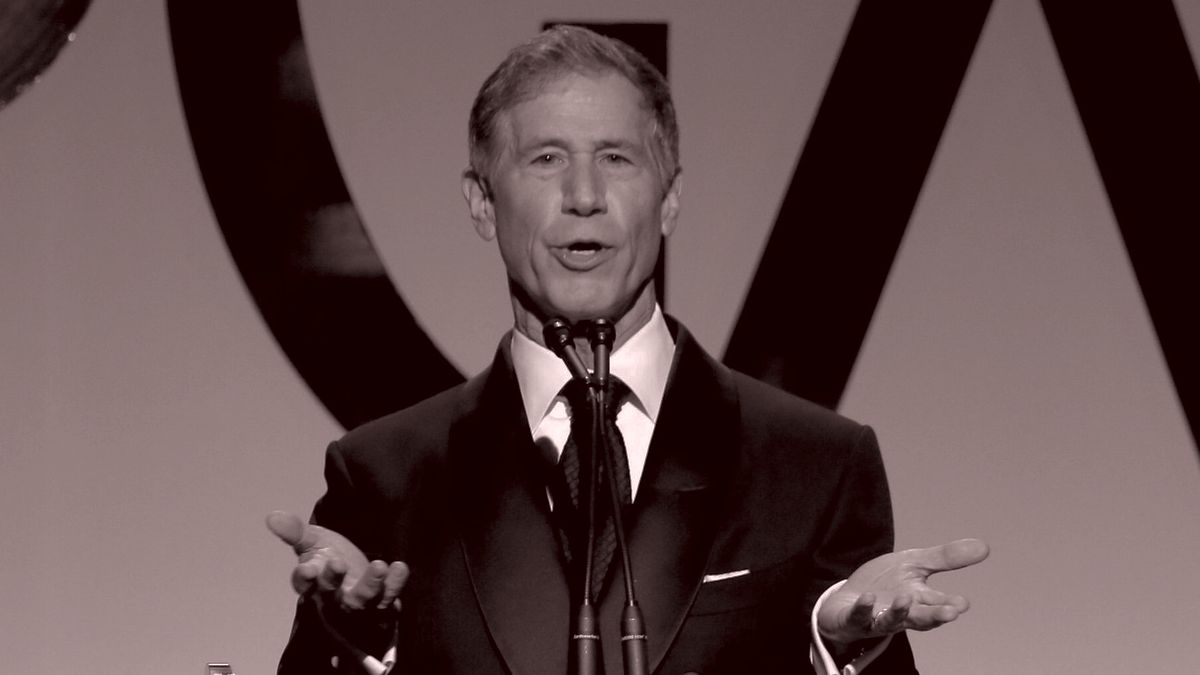Welcome back to What I’m Hearing+, the 50 percent tariff on top of your regular
WIH emails. Eriq Gardner is back today with the tale of a messy legal situation that could impact control of one of the last independent studios, Lionsgate. Plus, the latest in the Skydance-Paramount merger, and Elon’s dubious antitrust strategy. All yours, Eriq…
|
|
|
A MESSAGE FROM OUR SPONSOR
|
PERFORMANCE UNLEASHED
With a distinct sporting personality, the Range Rover Sport is a
peerless performer.
EXPLORE
|
|
|

|
Eriq Gardner
|
|
- The age of
antitrust Hail Marys: We are living in an age of questionable antitrust claims. Elon Musk, for instance, is currently suing advertisers for supposedly boycotting Twitter/X. The case has unsurprisingly caught the attention of Democrats on Capitol Hill, since Musk wields extraordinary influence in the Trump administration and has been linked to
allegations of strong-arming brands into spending on his platform. Musk’s antitrust lawsuit, playing out in Texas, continues to expand with new defendants—even though X’s original attorney in the case, Harmeet Dhillon, has withdrawn as she awaits confirmation to lead the D.O.J.’s civil rights
division. Tangentially, Trump’s claim today that Democrats are “illegally” boycotting Tesla has no grounding in the law. To state the obvious, it’s not illegal to not buy cars.
These types of claims are proliferating. Just last week, NASCAR filed counterclaims against Michael Jordan’s
car-racing outfit, accusing 23XI of being part of an “illegal cartel” of renegade teams boycotting events and interfering with negotiations over new broadcasting deals. Meanwhile, Musk just lost his bid for an injunction in his lawsuit claiming that Sam Altman orchestrated a boycott to prevent venture capitalists from investing in OpenAI competitors. (The judge nodded to a pro-competitive justification—the need to protect confidential information—and ruled that Musk hadn’t
adequately rebutted it.)
More importantly, keep an eye on the lawsuit against advertisers and agencies filed last year by Rumble, the right-wing YouTube competitor that tends to fly under the radar despite its powerful backers. (J.D. Vance and Peter Thiel were early investors, and the company’s general counsel, Michael Ellis, just took the number two job at the C.I.A.) Rumble has been aggressively pursuing provocative cases, including the
one I recently covered against a Brazilian Supreme Court justice, and the company may be headed to trial this summer against Google for prioritizing YouTube in its search engine.
Rumble filed alongside X last summer, but it’s slightly ahead of Musk’s case, procedurally. The defendants—the World Federation of Advertisers,
along with ad-buying giants WPP and GroupM—have moved to dismiss, arguing that Rumble hasn’t alleged an actual agreement not to advertise on its platform. They’re arguing that a general industry stance—in the name of brand safety—against providing ad support on a platform that occasionally trafficks in child pornography and terrorism commentary isn’t the same as a targeted boycott. Plus, they say, there were legitimate business reasons why brands steered clear of the platform. Simply put: Rumble
wasn’t worth the risk.
Read the full brief here. Rumble, whose lawsuit was originally filed by Mark Meador (Trump’s pick to be the third Republican at the five-commissioner F.T.C.), is set to respond next month, with a hearing likely this summer.
- A poison pill for Skydance-Paramount: As I
detailed last month, the Delaware Court of Chancery has ruled that Shari Redstone must hand over her texts and emails in response to the Rhode Island treasurer’s investigation into whether she unduly nudged potential Paramount buyers toward National Amusements Inc., her family holding company, rather than Paramount itself. Instead of complying, however, Paramount first wants the Delaware Supreme Court to weigh in on what qualifies as sufficient evidence, when
stockholders use the state’s corporate code to demand company records. Paramount’s lawyers claim that including press “rumors” as justification for opening up Paramount’s books could open the floodgates to fishing expeditions. (An ironic stance, given Paramount employs plenty of journalists at places like CBS News who depend on anonymous sourcing.)
Meanwhile, Shari is facing another potential headache. Project Rise Partners, the late-stage bidder for Paramount whose offer was rejected,
isn’t going away just yet. A lawsuit challenging the rejection of P.R.P.’s bid, filed by New York pension funds with a meaningful stake in Paramount, has gained traction, with the Court of Chancery signaling that it’s open to a trial and requiring notice before the Skydance merger officially closes. Meanwhile, P.R.P. also seems to be working the refs, trying to raise alarms with the F.C.C. over Skydance’s alleged ties to China via investor Tencent, potentially anticompetitive bundling of
channels, and the risks of A.I. infiltrating CBS News. Regardless of the legitimacy of these concerns, they are undeniably sophisticated poison pills—perhaps not a surprise, given that P.R.P. is being represented by two powerhouse law firms. We’ll see whether these moves impress F.C.C. chairman Brendan Carr.
David Ellison, who has no desire to let a jilted suitor interfere with his $8 billion prize, has been investigating Project Rise Partners, too. On
Monday, Skydance fired back—and hard. The company not only responded to the F.C.C., but also publicly linked P.R.P. to Edgar Bronfman, the media entrepreneur, who previously failed in his own bid for Paramount. Skydance made an attempt to trace P.R.P.’s origins to the wreckage of last year’s Chapter 11 bankruptcy of pay-TV network Cinémoi, alleging in turn that
Bronfman “appears to be connected with… Cinémoi.”
But Skydance’s legal team at Latham & Watkins was just getting started. They unleashed a blistering set of letters, which you can file under Don’t fuck with us. The Skydance lawyers allege “apparent fraud” on the part of P.R.P.— namely, that Goldman Sachs is not advising P.R.P., despite what P.R.P. has claimed; that P.R.P. has misrepresented its ties to certain investors; that P.R.P.’s primary backers aren’t registered
with regulators, and are operating out of nondescript New York City locations (complete with photographic evidence); and, finally, how Cinémoi’s bankruptcy lawyer withdrew from the case after P.R.P.’s leaders failed to pay a $25,000 fee. The Skydance team included receipts. Here’s a full look.
|
|
|
Speaking of nasty fights in the world of entertainment and finance…
|
|
|
After Lionsgate broke out its movie studio from Starz, some
bondholders found themselves left out in the cold. Now they’re going to court.
|
|
|
For years, Wall Street analysts have insisted that Lionsgate would be worth
billions more without the deadweight of Starz, its struggling cable network and streamer, dragging down its balance sheet. So when Lionsgate announced last year that it would spin off its studio unit, few were particularly shocked. But the exact way in which the company was cleaved in two left stakeholders miffed, with some bondholders going for a ride with the film and TV studio, and others getting stuck with… Starz.
Since then, as my partner Bill Cohan
reported last May, all manner of “creditor-on-creditor violence” has ensued. In short, some of the financial institutions backing Lionsgate a decade ago, when studios were scrambling to raise cash to compete with Netflix, signed off on the spinoff plan in exchange for juicier interest rates. But not everyone got a seat at the table. Other bondholders—most
notably, the Canadian government’s main pension fund—are getting left behind as Lionsgate splits in two, stuck with a legacy company stripped of the studio and its top assets, like John Wick and The Hunger Games, among other titles. Worse yet, they’re potentially subordinated beneath hundreds of millions of dollars of new debt.
Naturally, they’re livid. And they’re suing.
|
|
|
A MESSAGE FROM OUR SPONSOR
|
PERFORMANCE UNLEASHED
With a distinct sporting personality, the Range Rover Sport is a
peerless performer.
EXPLORE
|
|
|
With the spin-off expected to close as soon as next month, a New York court is
getting an earful. Lionsgate, for its part, says it understands the frustration of the jilted bondholders, but argues that under the indenture terms, they may sue only if they aren’t receiving payments on time. And so far, it seems, they are—though that’s cold comfort when they say the trading value of their notes is sinking, now that they’re backed by a cable TV relic. (Starz says it’s doing just fine digitally, and apparently the bond prices have actually surged in the past month, but for
reasons that remain mysterious. Starz has about 20 million subscribers in the U.S., 70 percent via streaming.)
One of the spinoff’s biggest losers is Thebes Offshore Master Fund, a hedge fund operated by Luxor Capital Group. Thebes has argued that Lionsgate and a select group of advantaged debt holders shouldn’t be able to trade up at the expense of everyone else, calling it a blatant violation of the bond market’s foundational principle of pari passu—equality all around. Why
would any sophisticated financial institution knowingly sign up for such a lousy deal? They wouldn’t, of course. Lionsgate, they claim, is trampling over the indenture’s “sacred rights” clause, which requires unanimous consent of noteholders before making certain changes.
Of course, there’s another view: Some of these creditors may be getting exactly what they signed up for. After all, many bought into less restrictive “cov-lite” loans, which have surged in popularity
during the past 15 years, creating loopholes for liability management exercises and the kind of creditor-on-creditor violence now at play.
Regardless, it’s a mess. And that’s before factoring in the dozens of other entities—BlackRock, California’s public pension system, and others—dragged into the litigation simply for voting their pocketbooks. Fortunately for Lionsgate, the aggrieved bondholders don’t appear eager to actually block the spinoff. What they seem to want is a deal tweak that
sweetens their position. But for now, they’re going to have to fight it out in court.
|
Why is a company worth billions more in pieces than as a whole? It’s a perplexing
reality, but let the record show that at the dawn of Trump 2.0—when M&A was supposed to roar back under a friendlier regulatory climate—the prevailing trend isn’t consolidation, but rather deconstruction. Simply put, the market values growth assets (like streaming) more attractively than legacy businesses (like cable TV) that are declining every year but still throw off tons of cash.
Comcast and Warner Bros. Discovery, for example, are currently looking to carve out their
linear businesses for this exact reason—a shift that Lionsgate C.F.O. Jimmy Barge underscored at last week’s Morgan Stanley TMT conference. “The rationale is maybe even more evident and important than ever,” he said. “This has been all about valuation. We don’t feel we are getting [enough] as a combined company.”
Barge and his colleagues may see the logic in severing the studio from the “misunderstood” Starz—an effort that hinges on shareholder approval, with a vote to be
taken 30 days following whenever the S.E.C. signs off—but getting to this point has been anything but simple. He described a yearslong process hampered by the Covid pandemic and the Hollywood writers strike, further complicated by Lionsgate C.E.O. Jon Feltheimer’s detour into acquiring eOne, before ultimately landing on the notion of merging one part of the business with Hollywood investor Harry Sloan’s Screaming Eagle SPAC.
Sloan, a former Lionsgate
chairman and current board member, is the architect of these financial gymnastics, which will transfer Lionsgate’s 70,000-title library—including, somewhat ironically, the buzzy upcoming Seth Rogen Apple TV+ series The Studio—to his SPAC. Following the transaction, Lionsgate shareholders will control 87.3 percent of the newly formed entity, with Screaming Eagle’s owners taking the rest after injecting $350 million in cash.
Naturally, Canada’s public pension fund
and Thebes are challenging the deal, arguing that Screaming Eagle is interfering with their rights under the original indentures. Sloan’s vehicle counters that there’s nothing tortious without an underlying contract breach—and again, nobody is alleging bondholders aren’t getting paid. They also argue that their conduct is excused by legitimate economic justification.
A similar defense is coming from the bondholders participating in the spinoff—the lucky bunch being handed new notes backed
by the studio, now paying interest at 6 percent per year instead of the previous 5.5 percent. In return, these favored creditors permitted Lionsgate to strip key protections under the original indenture, including a requirement that notes be repurchased upon any “change of control.” Despite allegedly conspiring behind closed doors, this set of bondholders insist they’re merely innocent bystanders.
Among the chosen few is Liberty 77, the private equity fund run by former movie producer
Steve Mnuchin, the Secretary of the Treasury under Trump I, who has been aggressively buying up Lionsgate stock and debt for more than 18 months—even before the Screaming Eagle deal was announced. His firm, now Lionsgate’s second-largest shareholder with more than 17 percent ownership, is a co-defendant in the case, and among those pleading for an escape hatch.
Whether this legal skirmish exposes backroom dealmaking remains to be seen. One reason to think Thebes could
advance past dismissal motions? A recent Fifth Circuit Court of Appeals ruling in a case involving mattress company Serta Simmons. There, appellate judges took issue with an “uptiering” maneuver that advantaged some creditors at the expense of others, finding it violated equal treatment guarantees. The context was different, obviously, as was the jurisdiction, but as one of
the first major rulings on creditor-on-creditor violence, the decision sent ripples through financial and legal circles. Thebes is now citing the Serta ruling in the Lionsgate case, which could be one of the next big decisions on this front—perhaps even influencing how other entertainment companies finesse their lender negotiations as they navigate a rapidly evolving industry.
Of course, the likely real endgame for Lionsgate’s Feltheimer and vice chairman Michael
Burns is to position the company for a sale. Ever since Amazon scooped up MGM Studios for $8.5 billion in 2021, Lionsgate has been viewed as the next logical indie giant to sell. But I’m told that Lionsgate’s team isn’t getting much traction on that front—a potential driver behind this latest restructuring. So think of what’s happening as being like filing for divorce, hitting the gym, and slimming down before looking for a new partner. But which Hollywood companies will survive long
enough to be along for the ride?
|
Thanks, Eriq. I’ll be back on Thursday night.
See you then,
Matt
|
|
|
Puck founding partner Matt Belloni takes you inside the business of Hollywood, using exclusive reporting and
insight to explain the backstories on everything from Marvel movies to the streaming wars.
|
|
|
Puck’s daily art market email, anchored by industry expert Marion Maneker, offers unparalleled access to the
mega-auctions and galleries, elite buyers and sellers, and the power players who run this opaque world. Wall Power also features Julie Brener Davich, a veteran of Christie’s and Sotheby’s, who provides unique insights into how the business really works.
|
|
|
Need help? Review our FAQ page or contact us for assistance. For brand partnerships, email ads@puck.news.
You received this email because you signed up to receive emails from Puck, or as part of your Puck account associated with . To stop receiving this newsletter and/or manage all your email preferences, click
here.
|
Puck is published by Heat Media LLC. 107 Greenwich St, New York, NY
10006
|
|
|
|
























